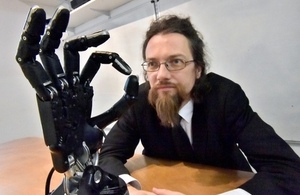Robotics success story: ‘the hand that thinks for itself’
Innovate UK funding helps Shadow Robot Company move out of the laboratory and into the commercial world.

Shadow Robot Company managing director Rich Walker: "We’re doing stuff no one in the world is doing."
A London-based company has developed a robot hand that can decide for itself how and when to pick up, grip and handle objects – even kitchen utensils, to create a gourmet-standard meal.
Grant funding from Innovate UK helped the Shadow Robot Company develop the Grasp Stabilisation and Control system that makes it all possible.
Shadow Robot was set up in 1997 by a group of people who were building robots for fun. They wanted to move out of the research lab and into the commercial world but did not have the resources until they were awarded Innovate UK funding.
They have now grown from the 2 original founders to 21 employees.
An Innovate UK competition for developing novel concepts in autonomous service robots came along at the right time. In 2013 Shadow Robot was awarded grant funding of £70,000 towards total costs of £93,000 for its project.
Algorithms and software
It ran for 12 months from mid-2013 and Shadow Robot used the funding to get a demonstration system of their Shadow Dextrous Hand ready for a robotics trade fair in Munich. They were then one of just 7 companies invited to join a Robotics Mission to California in June 2014 led by Innovate UK and UKTI.
The Shadow Dexterous Hand is a robot hand with 20 movements – most robot grippers have two. Managing director Rich Walker explained:
It uses algorithms and software to mimic what goes on in the human brain, so a robot hand can do the things that you or I do naturally – see an object, pick it up, hold it and put it down.
We’re doing stuff no one in the world is doing. We have a working model, and we’ve shown potential customers how it could work for them. The next step is working with partners to see how it can be used in an industrial setting.
Easily adapted
When fully commercialised, The Shadow Dextrous Hand is just as likely to seen in hazardous environments such as nuclear decommissioning, a market estimated at £25 billion worldwide.
In 2011 Shadow Robot received funding of £31,516 as part of a 2011 collaborative feasibility study ‘telerobotics to teleautonomy’ involving the National Nuclear Laboratory and other partners. Further funding of £76,500 was awarded to the company in 2013 for a follow-on collaborative project with Queen Mary University in London, for a study into advanced telerobotics control systems.
Shadow Robot is already talking to major companies in pharmaceuticals, logistics, food manufacturing and the automotive supply chain.
It’s the way Innovate UK bridges the development gap between the research lab and commercial viability that makes it so valuable, according to Rich.
Innovate UK helps companies like us make that critical transition from boutique engineering to rugged industrial engineering – from a system that just works in the lab to one with real commercial applications. It’s a great model.
So where people would not normally come together, Innovate UK enables them to meet and understand problems, and then receive competition funding to try and solve those problems. This is something that is now the envy of the world.
Find out more about Innovate UK funding awards and see our latest funding competitions